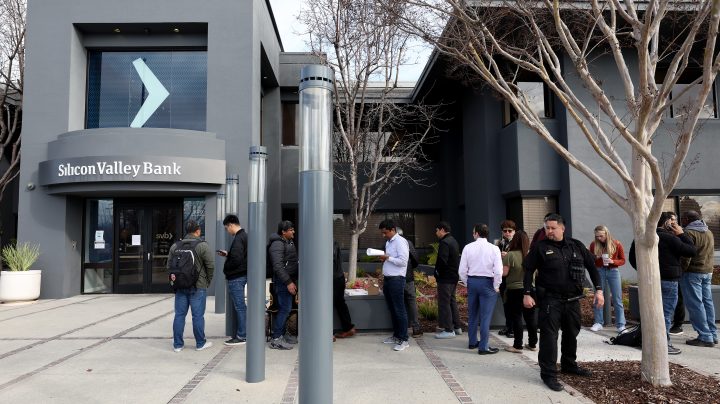
Bank rules rollback contributed to SVB’s failure, critics say
Bank rules rollback contributed to SVB’s failure, critics say

How did we end up with big institutions such as Silicon Valley Bank and Signature Bank failing so spectacularly? And whose fault is it? Those were the questions on President Joe Biden’s mind Monday morning as he called for a full accounting of what happened.
One of the culprits he blamed was the rollback of the Dodd-Frank banking regulations that were Washington’s response to the 2008 financial crisis:
“Unfortunately, the last administration rolled back some of these requirements — I’m going to ask Congress and the banking regulators to strengthen the rules for banks, to make it less likely this kind of bank failure would happen again,” Biden said.
What did those rollbacks look like and why do they matter now?
The original Dodd-Frank law said that once a bank became bigger than $50 billion in assets, it would be subject to additional rules and oversight. Then came 2018 and the Economic Growth, Regulatory Relief, and Consumer Protection Act — aka the Dodd-Frank rollback.
“In 2018, the law said, ‘Oh, now that only applies to banks with more than $250 billion in assets.’ And it turns out Silicon Valley Bank at the time — and actually even last week — fell under that threshold,” said Erin Lockwood, who teaches political science at University of California, Irvine.
That’s despite the fact that it was the 16th largest bank in the country.
“Before the law was passed, banks the size of Silicon Valley Bank would have been required to have more stress tests more frequently,” said Dennis Kelleher, CEO of Better Markets, which lobbied against the rollback.
Banks like SVB also would have crucially had to maintain more liquidity. You know, to help out in case of a bank run.
“There is definitely an ‘I told you so’ moment for this,” said Carter Dougherty with Americans for Financial Reform. “Congress chose — and the regulators ran with it — to peel back rules that would have given us a better chance of heading off this crisis.”
But it’s hard to draw a straight line between the regulatory rollbacks and these bank failures because a lot of other things went wrong.
“You knew just by looking at this bank that it was growing at exceptionally rapid rate, which should have been a red flag to look at,” said Thomas Hoenig with the Mercatus Center at George Mason University and former vice chair of the Federal Deposit Insurance Corp.
“So I don’t blame it on so much on the rollback of Dodd-Frank,” he continued. “I blame it on the fact that the bank management didn’t understand the fact that interest rates change and they need to be managing their portfolio accordingly.”
Plus, Hoenig added that bank regulators still have the tools that could have spotted the problem, they just didn’t use them.
There’s a lot happening in the world. Through it all, Marketplace is here for you.
You rely on Marketplace to break down the world’s events and tell you how it affects you in a fact-based, approachable way. We rely on your financial support to keep making that possible.
Your donation today powers the independent journalism that you rely on. For just $5/month, you can help sustain Marketplace so we can keep reporting on the things that matter to you.












